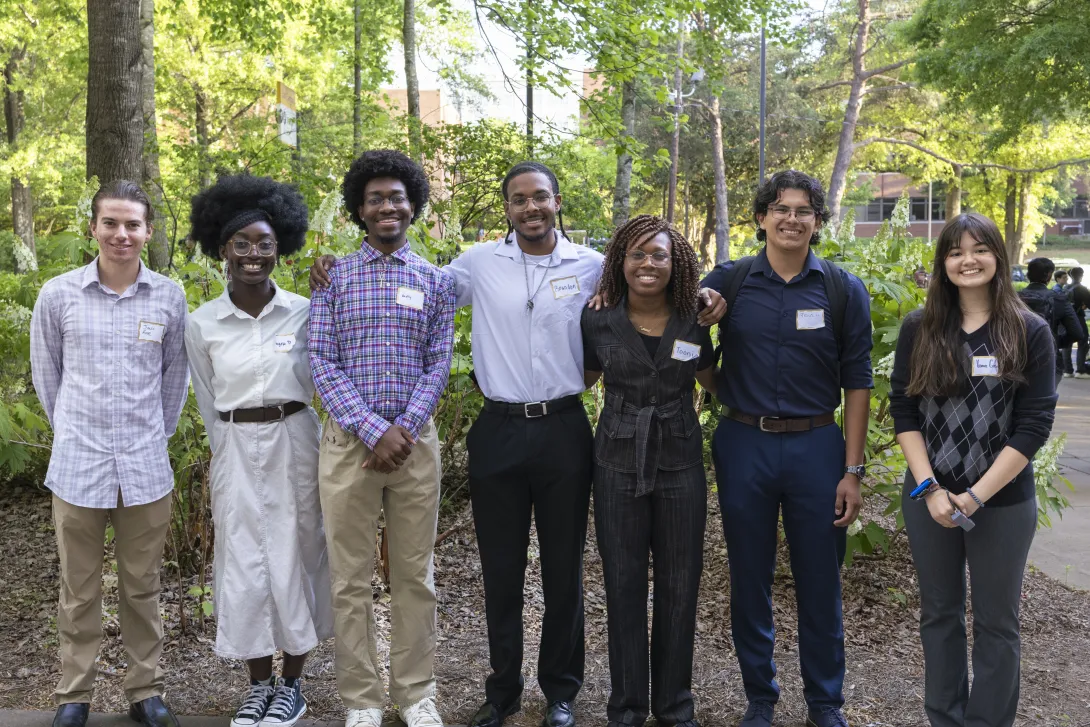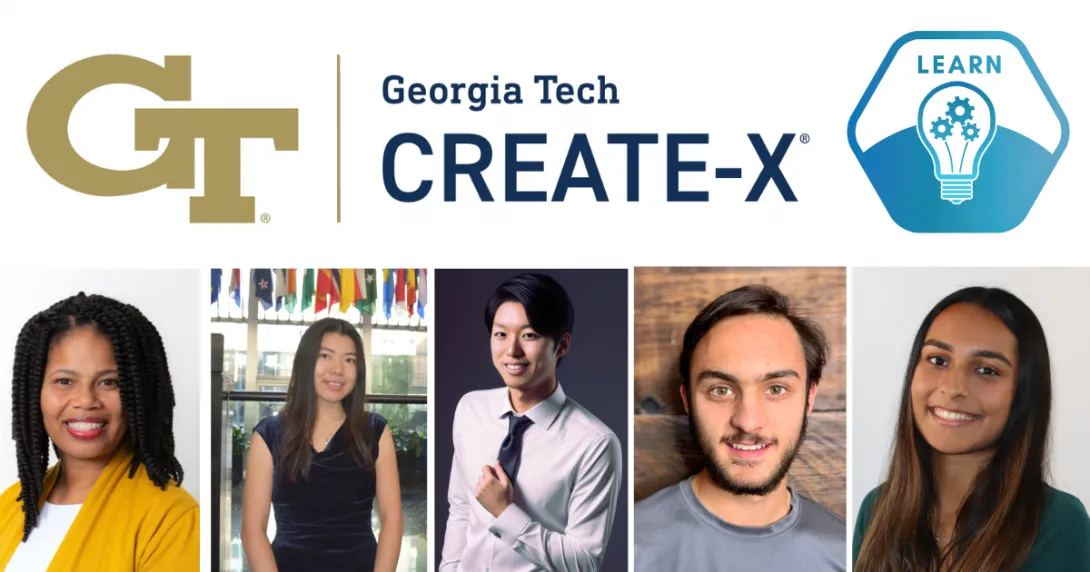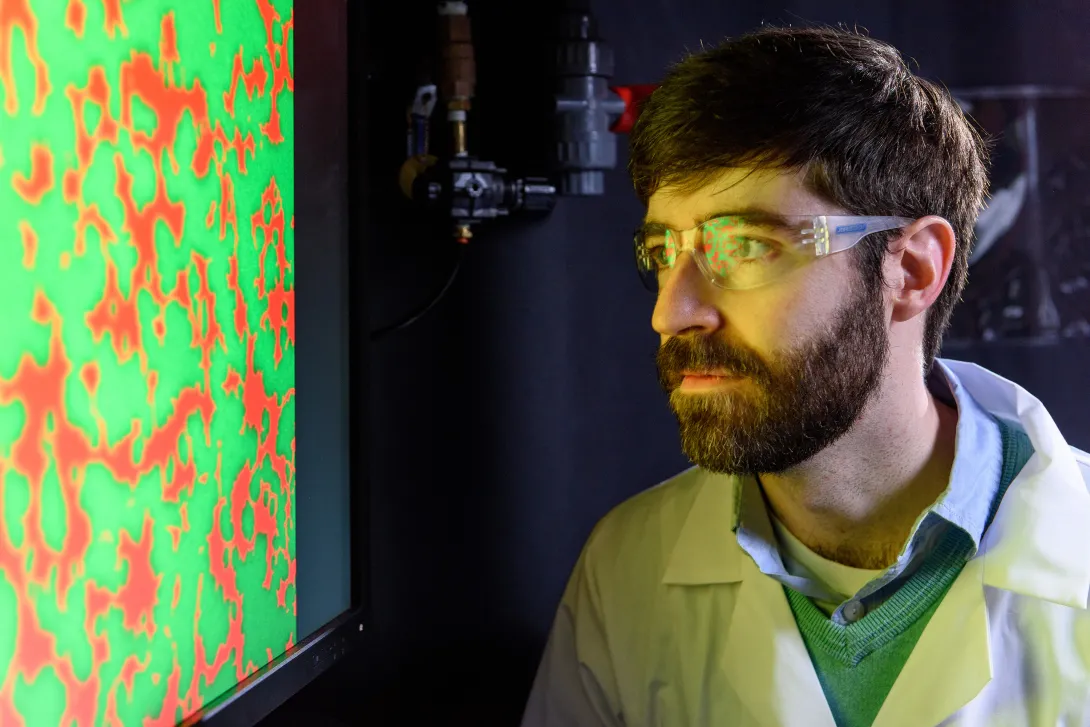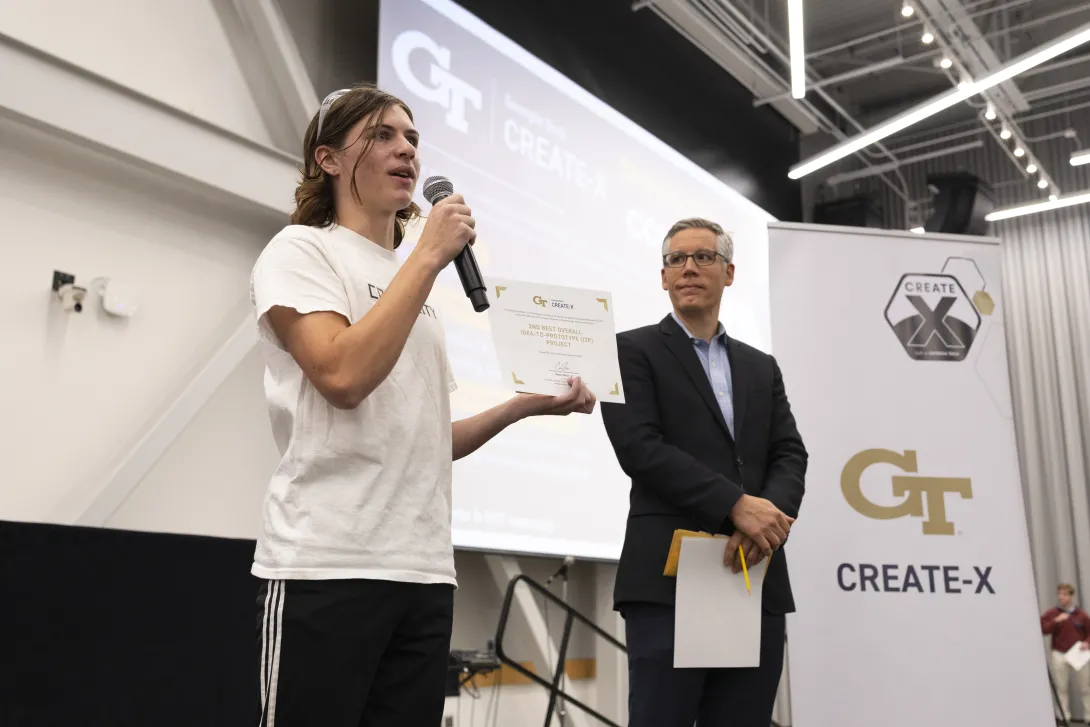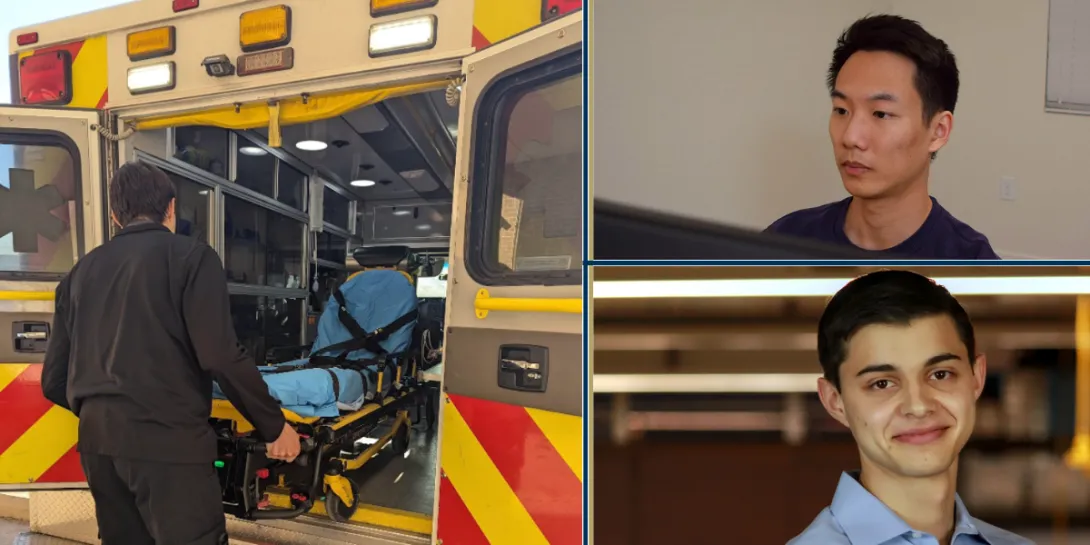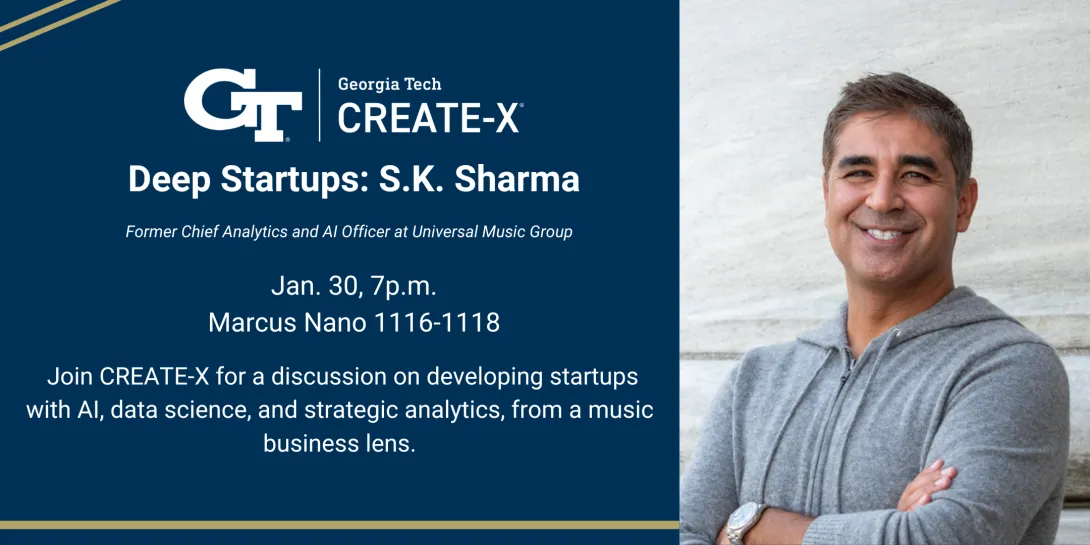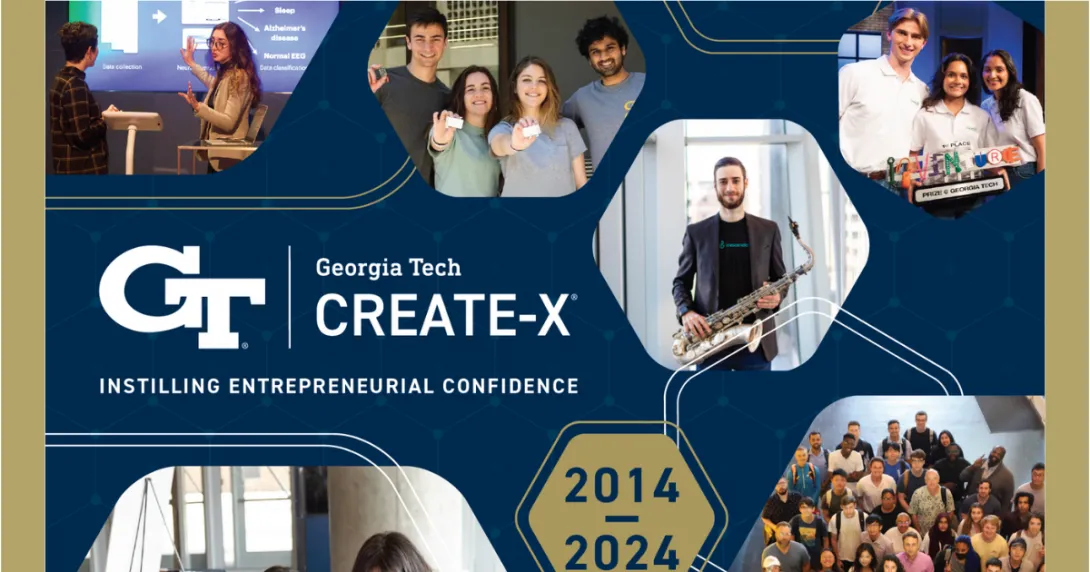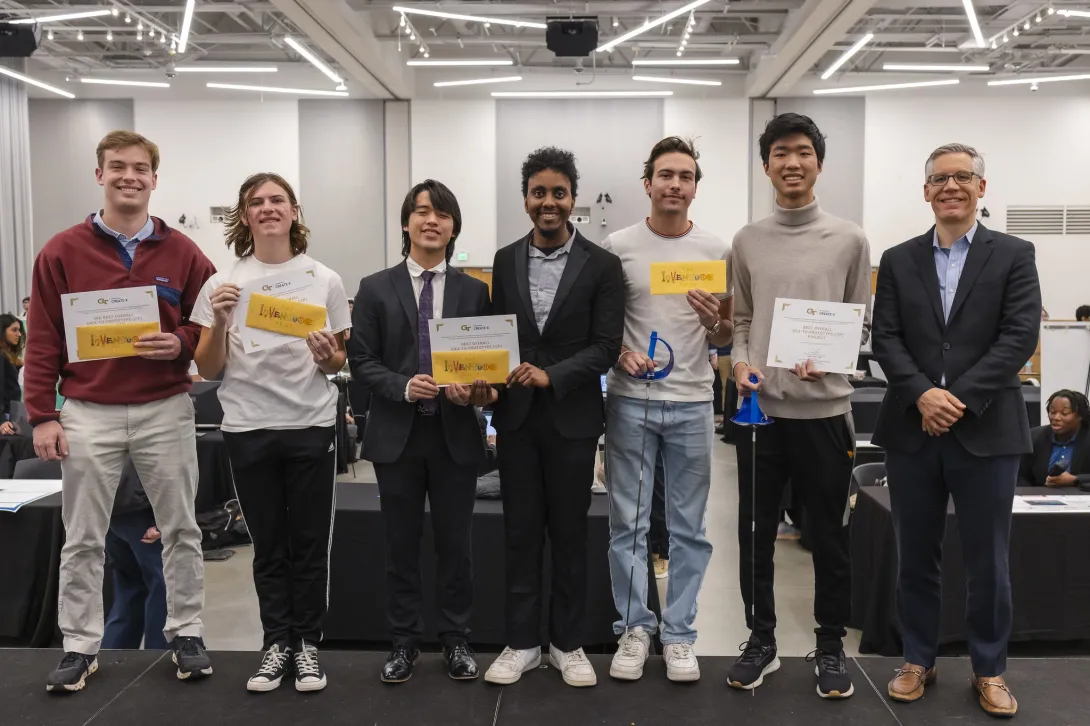May. 30, 2025
CREATE-X, Georgia Tech’s premier entrepreneurship program, kicked off its 12th Startup Launch cohort this month with a record-breaking 137 student teams and 25 faculty and research teams — totaling 318 founders. The summer-long accelerator, known for turning ideas into real-world ventures, is once again positioning Georgia Tech as a national leader in invention and startup creation.
This year’s cohort spans a wide range of industries, including artificial intelligence, defense, healthcare, gaming, sustainability, media management, agriculture tech, fashion tech, education, and more.
“These founders are in the messy middle and that's a beautiful place to be. There’s a lot of freedom in that,” said Margaret Weniger, director of Startup Launch. “We’re all going to be in this together. It's a safe space to try new things. It’s OK if it doesn't work out because what we want founders to learn is an entrepreneurial mindset and entrepreneurial spirit — something you take with you no matter what you do after this.”
Over the next 12 weeks, teams will validate ideas, build products, and acquire customers with the help of dedicated coaches, a robust founder community, and a network of mentors and alumni.
Raghupathy "Siva" Sivakumar, Georgia Tech’s inaugural vice president of Commercialization and the faculty founder of CREATE-X, spoke about the core of CREATE-X and what it would take for founders to succeed.
“Startup Launch is not about Georgia Tech gaining from your success. We are here just for one reason, which is to make you successful,” he said. “You need to hold yourself accountable. You need to be ambitious in terms of how big a problem you solve. You need to be emphatic that the customer matters. The successful teams are 100% behind what's going to make the lives of customers easier and better.”
In 2014, CREATE-X was co-founded by Sivakumar, Steve McLaughlin(who is now the president of The Cooper Union for the Advancement of Science and Art), and other Georgia Tech faculty, including Ray Vito, Craig Forest, and Ravi Bellamkonda (who is now the executive vice president and provost of The Ohio State University). The program received its initial major philanthropic support from Chris Klaus, a Georgia Tech alumnus and tech entrepreneur, whose gift helped launch the initiative, and , played a key role in building out the program's maker courses. Over the years, CREATE-X has continued to grow, thanks largely to the philanthropic support of alumni and foundations who believe in its mission.
In the last decade, the program has produced over 650 startups, $2.4 billion in portfolio valuation, and had eight founders named to Forbes’ 30 Under 30. Wagner shared stories of past teams who pivoted dramatically — from a glucose-monitoring pillow to a sobriety app now valued at over $350 million, and from a camping gear delivery service to a billion-dollar logistics platform.
“We don’t know which ideas will become the next unicorns,” Weniger said. “But we’re betting on you.”
At the kickoff event, McLaughlin and Klaus were honored for their contributions to Georgia Tech’s entrepreneurial ecosystem. McLaughlin encouraged the founders through the story of CREATE-X.
“From the very beginning, we challenged CREATE-X to be a startup as well. To this day, CREATE-X has raised its own money to do this. It's a reminder of what it takes to make this happen,” he said. “This is the most difficult challenge you have ever taken. I think at the time, we were probably skeptical about whether students could do it. Now we know that you can.”
Georgia Tech President Ángel Cabrera reflected on the impact of McLaughlin, Klaus, and others who saw the vision of Georgia Tech being an entrepreneurial campus.
“Ten years ago, this was a crazy, absurd idea,” he said. “Now, 150 teams are working on their own crazy ideas. Even though sometimes there's this idea of the entrepreneur as a loner, what you learn very quickly is entrepreneurship is a team sport.”
Klaus spoke about people collaborating and helping solve problems together.
“I'm especially inspired by Georgia with its complex history,” he said. “It continues to be a place where peace can be envisioned and pursued. I think this recognition strengthens my commitment to building bridges, resolving conflict, and lifting up voices that seek unity. As you build your businesses, you'll be building collaborations and partnerships, and hopefully make the world a better place.”
As the summer progresses, founders will be guided by CREATE-X’s core values: experiential education, entrepreneurial confidence, and real-world impact. Weniger encouraged teams to “show up uncomfortable” and “leverage every single resource” available.
The journey will culminate at Demo Day, where teams will showcase their startups to investors, industry leaders, and the broader community. The event is free, open to the public, and promises a front-row seat to the next wave of Georgia Tech-born innovation.
Demo Day 2025 will take place on Thursday, Aug. 28, at 5 p.m., in the Exhibition Hall. For more information and to RSVP, visit the CREATE-X Demo Day Eventbrite.
News Contact
Breanna Durham
Marketing Strategist
Apr. 28, 2025
At the Spring 2025 Idea to Prototype (I2P) Showcase, a prototype helping car enthusiasts find niche vehicles and their histories came out on top. Jack Rose, a junior in computer science, took home first place, a golden ticket to CREATE-X’s summer accelerator, Startup Launch, and advancement into the semifinal round of the InVenture Prize, a faculty-led innovation competition for undergraduate students and recent Tech bachelor’s graduates.
Second place was awarded to Team Sensible, made up of juniors Oluwatooni Alade, computer science; Brandon Parker, computer science; Angela Duodu, computer science; Jesus Sierra Jr., computer science; and Hadley Williams, computer engineering. Sensible is a browser extension that rates the sustainability of products users find online and offers alternative products for items that score low.
Third place went to Team Onyc, which includes Yasmine Green, a first-year mechanical engineering student. Onyc replaces the computer mouse with a wearable alternative that allows users to control computer navigation with the movement of their fingertips and fingernails.
Dozens of teams competed at the showcase, which is the culmination of I2P, a CREATE-X course focused on supporting students in creating solutions. The course offers research credit (for undergraduates only), up to $500 in reimbursements for physical material expenses, the opportunity to work collaboratively across majors, and faculty mentorship. It is held in the spring, summer, and fall, and it’s open to undergraduate and graduate students from all majors.
Read our Q&A with the winner and stay tuned for our interviews with the other winning teams.
Team Carchive
Jack Rose, Junior, Computer Science
Why did you pursue your startup?
Rose: I’ve been into cars my whole life. Trying to track cars is my hobby. There are always edge cases, and how are you planning to attack them? Because I spent so much time, especially working with other people, getting this data, and trying to figure this out, I became very adept at understanding the data. The dealers, collectors especially, were trying to understand the whole story, so they would come to me. But the way I had to do it was spreadsheets all over the place, and I was trying to find a solution to keep it all in one spot. I couldn’t find a way to do it, so I said, “Well, I’ll build it.” And then I got into I2P.
What was challenging about building your prototype over the semester?
Rose: This semester, it was mainly trying to come up with the schema and how to physically account for the edge cases. It’s not easy; it took a lot of deep thought, discussions with other people who are into these niche cars, and understanding what details we needed. I’m still trying to add more things and figure it out. It’s not perfect, but it’s enough.
What was your favorite part about I2P?
Rose: Adding features that I was looking for. For example, let’s say I was looking for a car. Filter all the cars over 25 years old and imported to the U.S. — I can easily search my database.
What would you say to students who are interested in entrepreneurship?
Rose: It’s always, “You should have started sooner.” I’ve always thought about it. My biggest advice is to just start doing it, even if it’s a little bit here, a little bit there. If it doesn’t work out, at least you’ve tried.
A photo gallery from the Spring 2025 I2P Showcase can be viewed on the CREATE-X Flickr page.
Students interested in the I2P program can register for the upcoming summer and fall semesters. The deadline for Summer 2025 is May 14, and the deadline for Fall 2025 is May 16.
CREATE-X's next event, Demo Day, will take place on Aug. 28 at Exhibition Hall, where more than 100 startups will be on display. Attendees can experience the newest batch of founders leveraging the latest technology to solve pressing challenges. The event offers an opportunity to network with entrepreneurs, industry leaders, and passionate enthusiasts, and supports the next generation of innovators. Register for Demo Day today and be a part of these founders’ journeys!
News Contact
Breanna Durham
Marketing Strategist
Apr. 04, 2025
Four students from Startup Lab have been selected to join the 2025 immersive cohort at South by Southwest (SXSW) in Austin, Texas. Alex Aridgides (mechanical engineering and economics), Shinhai Chen (industrial engineering), Varuni Chopra (industrial engineering), and Christie Peng (computer science) are the first Georgia Tech students to be invited to the program.
The weeklong, all-expenses-paid program offers university-affiliated innovators the chance to refine their innovations, engage in customer discovery, and network with industry leaders and peers at SXSW. The annual festival celebrates technology, film, music, education, and culture. Students participated in a competitive application process, which involved submitting applications, meeting specific evaluation criteria, and being selected by a panel of industry experts, mentors, and SXSW organizers.
Yolanda Payne, the students’ Startup Lab instructor, presented the SXSW opportunity in class.
"My goal is to be their biggest cheerleader,” she explained. “I had great teachers who helped me get to where I am today, and I strive to emulate their support. I’m always willing to guide students toward new opportunities."
She learned about the SXSW immersive cohort from Nakia Melecio, director of the National Science Foundation I-Corps Southeast Hub. The $15 million initiative crosses nine major research universities in the southern U.S. and accelerates the translation of deep tech research into commercial ventures. The hub works closely with entrepreneurial faculty, students, and researchers to equip them with the tools, networks, and support to bring their innovations to market.
Melecio plays a central role in identifying and advancing strategic opportunities for university partners and their entrepreneurial teams. “When the opportunity to participate in SXSW arose, I recognized it as an ideal platform to showcase the talent and innovation coming out of our region.”
Melecio added that Startup Lab is ideal for amplifying NSF I-Corps’ goals because of the course’s proven track record of fostering hands-on learning and commercialization readiness. “Startup Lab helps prepare students not just to think entrepreneurially, but to act on their ideas with confidence and a structured path forward. It was a natural fit for this opportunity.”
Payne says the experience students gained in Startup Lab helped prepare them for the immersive cohort. “The knowledge is being solidified by an experience you’re having in my class and the real world.”
Chopra agrees that Startup Lab teaches essential business development fundamentals and customer discovery principles, skills that are relevant to the SXSW program. She recommends the course to other students and emphasizes the value of combining engineering or technical backgrounds with entrepreneurship skills.
“We take a lot of classes that are directly related to our major, and they're very technical. But when it comes to wanting to start something of your own or even understanding how startups work, it's completely different than the rest of our coursework.”
Startup Lab is a three-credit course that focuses on evidence-based entrepreneurship. This hands-on class covers ideation, teamwork, customer discovery, minimum viable products, the business model canvas, and other topics. Students learn how to launch a startup by integrating in-class lectures with practical, out-of-class activities, including interviewing potential customers and refining their startup ideas based on real-world feedback.
The program provides access to valuable resources, mentorship from seasoned entrepreneurs, and a supportive community to help students develop their startups. Startup Lab and NSF I-Corps are also exploring other industry showcases for student entrepreneurs like SXSW.
Chen chose Startup Lab to pursue his entrepreneurial interests. “I knew that Georgia Tech had a really good startup culture, so I researched what they had to offer, and Startup Lab was the first step." He also noted Payne's impact as an instructor. "The best part is how much she cares about the topic. She has a lot of background knowledge and is passionate.”
Startup Lab is unique because it "de-risks the business model,” Payne says. Many entrepreneurs first build their products and then talk to potential customers. However, Startup Lab students perform customer discovery, sharing their ideas with potential end users, listening to their needs and feedback, and then building the product.
Peng recalls a powerful moment of pitching an idea for an app to streamline MARTA operations. “I had a fun time coming up with this idea. We learned a lot about interviewing, coming up with possible solutions, and refining our idea,” she says. "Being surrounded by so many brilliant individuals at Georgia Tech makes it easy to get idea formation or networking connections you need for your idea to succeed."
Aridgides has ambitious post-program goals, envisioning creating change through entrepreneurship. "I want to start a company to change the world for the better and make a big impact. That's my life goal. I think through a company, I can achieve that."
Payne reminds students that they possess something many adults lack: time to explore different ideas. She also says Startup Lab can help students value and see their ideas in new ways.
“They don't recognize that the product they're working on could be pursued through entrepreneurship or think of themselves as entrepreneurs. And even if they don't pursue it, it helps them in all aspects of life because business and capitalism are part of what we do every day.”
If you’re a student interested in adding entrepreneurship to your course schedule, registration for the summer and fall semesters opens on April 15. In addition to Startup Lab, students also have the opportunity to build a prototype with support through Idea to Prototype and CREATE-X Capstone Design.
News Contact
Contact
Article by Alyson Key
CREATE-X Contact:
Breanna Durham
Marketing Strategist
Mar. 28, 2025
Peter Yunker boils down his advice for researchers wanting to commercialize their lab advances.
“You can’t go it alone,” said Yunker, an associate professor of physics at Georgia Tech.
In January, Yunker co-founded the biotechnology startup TopoDx LLC, with David Weiss, an Emory University School of Medicine researcher and director of the Emory Antibiotic Resistance Center, and Yogi Patel, a Georgia Tech alumnus with a background in business development and bioengineering.
“Researchers often think that they have a good commercialization idea to help people, but that alone does not guarantee success,” said Yunker. “Look for partners with complementary skills who understand aspects of the commercialization process that you don’t. Find mentors with business and scientific backgrounds in the specific industry you want to enter.”
TopoDx has developed a microbial test to identify antibiotic resistance and susceptibility rapidly and accurately. Current tests produce a result in three to five days. TopoDx’s approach can gain a result within four hours. Every hour counts in treating serious infections. Delays in accurate treatment can increase antibiotic resistance, which is a global challenge, causing up to 1 million deaths a year.
The company’s testing method was inspired by a fundamental biophysics project in Yunker’s lab. His team was interested in understanding how bacterial colonies behave. They tested white-light interferometry, a technology that can measure bacterial colonies down to the nanometer level.
“White-light interferometry allowed us to identify changes in the topography of a colony that indicated larger changes in the volume of cells in the entire colony,” said Yunker. “We thought this might have practical applications.”
The next step was giving research talks at meetings and looking for collaborators. “I wanted to find someone with expertise on the bacteriology side, and I was very fortunate to meet David Weiss,” Yunker said, noting his proficiency in heteroresistance, a phenomenon where a small subset of a bacterial colony resists an antibiotic.
“If you have just one antibiotic-resistant cell in a hundred cells, it can cause treatments to fail,” said Yunker.
The two collaborators hoped to commercialize their technology, identifying heteroresistance in microbial samples. However, they needed guidance in creating a business model. They consulted Harold Solomon, an entrepreneur with Georgia Tech VentureLab and a principal in the Quadrant-i program, a specialized program helping Georgia Tech faculty and students commercialize research.
Solomon became a key mentor. He guided them away from an ill-advised partnership and instead introduced them to Yogi Patel, who became a co-founder and the company CEO.
This new collaboration provided the team with an important lesson — one that Yunker passes along to other researchers looking to commercialize their discoveries. “Seek expertise outside your field, be humble about your knowledge limitations, and view collaboration as a strategic partnership,” he says.
When Patel came on board, he conducted extensive interviews with more than 15 clinical professionals.
“You need to interview end users or purchasers of whatever solution you want to build,” said Patel. “Ask them if the problem you think you may have solved is a problem with scale, with a market need.”
Clinicians, Patel learned, did not see heteroresistance as a significant issue. Instead, the slow pace of antibiotic testing was identified as a major problem. Faster testing could allow clinicians to prescribe targeted drugs more quickly and accurately, reducing unnecessary antibiotic use and the risk of multi-resistant infections.
With this survey information, Patel asked Yunker and Weiss to rethink how their technology could be commercialized.
“A company must solve a real-world problem,” said Patel. “I recommended that we switch from heteroresistance to solving slow antibiotic testing. We could keep heteroresistance as something we can still do as a second or third priority.”
TopoDx’s new technology can measure, with single-nanometer accuracy, how bacterial colonies are responding to antibiotics in real time. This method could revolutionize how antibiotics are tested and prescribed. Testing would be conducted on a countertop device about the size of a large microwave. The co-founders envision the device as eventually being used by urgent care facilities and hospitals.
“We want to make microbial testing susceptibility accessible anywhere and everywhere,” said Patel.
Adam Krueger, once a Ph.D. student in Yunker's lab, has continued to refine the technology. Now a post-doctoral researcher, Krueger joined TopoDx in a technical leadership role to expand the technology’s capabilities for microbiological diagnostics.
“We will keep pushing the envelope forward scientifically while we try to commercialize the accomplishments that we have already made,” Yunker said. “We hope that some fundamental studies we are doing now out of scientific curiosity could lead to further commercial applications.”
Georgia Tech faculty members and graduate students, join the Quadrant-i Startup Launch Program to commercialize your research this summer: Over 12 weeks, you'll receive comprehensive support including guidance from experienced mentors, a $10,000 commercialization grant, and $150,000 worth of in-kind services. Showcase your innovation at Demo Day, where you'll have the opportunity to present to over 1,500 attendees, including industry leaders and investors. Apply today! Applications close April 11.
News Contact
Written By John H. Tibbetts
Internal Contact:
Breanna Durham
Marketing Strategist
Mar. 03, 2025
On April 21 at 5 p.m. in the Marcus Nanotechnology Building Atrium, dozens of teams will present prototypes at the Spring 2025 Idea to Prototype (I2P) Showcase. They will be vying for a chance to get a golden ticket in CREATE-X’s Startup Launch program, which gives participants $5,000 in optional seed funding and $150,000 in in-kind services like accounting and legal services, mentorship, and entrepreneurial education, among other benefits.
The I2P course, where these students develop their prototypes, offers research credit for undergraduate students up to $500 in reimbursement for physical material expenses and faculty mentorship. It’s open three times a year, in the spring, summer, and fall. Both undergraduate and graduate students can take the course, and students can take it up two times.
Convexity Electronics finished in second place at the Fall 2024 I2P Showcase. The company delivers smaller, faster, and more cost-effective circuit boards compared to traditional lithography-based methods. We delved into the team’s journey, challenges, and aspirations in this exclusive Q&A with one of its founders, Calla Scotch.
Q&A with Team Convexity's Calla Scotch
Team Members:
Calla Scotch, Sophomore, Mechanical Engineering and Materials Science and Engineering
Atharva Lele, Sophomore, Engineering
Anuj Pandey, Junior, Mechanical Engineering
Why did you pursue your startup?
It’s so complex. There are so many routes, and it's so new in terms of how many people are working on it. One day I woke up and couldn't stop thinking about it, then I couldn't sleep about it, and then I couldn't stop working on it. It was one of those things where I couldn't stop.
Traditionally, circuit boards — the stuff that's in your phones, computers, cameras, cars, everything — are made entirely subtractively. You have your block of material and cut away the stuff you don't want. It's a well-thought-out manufacturing process, but it's mostly very expensive and very slow. The materials and electronics manufacturing industry hasn't changed in about 30 years because it's been optimized as much as it can be.
What is your goal with Convexity?
To take that subtractive process and, instead of doing that, build the same circuits additively. I'm working on 3D printing the insulative base material, then 3D printing the conductive material, then using an electrical process to take those conductive materials and convert them into copper. And then doing layer after layer after layer to make the same circuits that someone in a subtractive process would do.
If you have traditional manufacturing, it takes about two weeks to ship from China, and it takes about a week to make a lab. My goal would be to make them in about five hours and then courier them over the same day. You don't need a big serial manufacturing facility if someone needs 6,000 boards. You don't have 6,000 printers in one room; all your printers are connected to the cloud. You could even go from 2D electronics to three-dimensional electronics. We just want to make more, smaller, faster, and cheaper than traditional manufacturing.
What surprised you about I2P?
How much time it took out of my day and how much I didn't want to do as much homework anymore. It made me want to focus all of my time on this and on how many different avenues there were to do what I wanted to do. I probably went through 30 different iterations of completely different scientific topics. I think because of how many options there were and how crazy scientifically advanced each of them was, it is what keeps me going.
What was your favorite part about I2P?
I did I2P for two semesters, and the best thing about it is getting to work on your own project and your own research for class credit.
What was challenging about building your prototype over the semester?
Sifting through all the research and development that has gone into this field. Electronics manufacturing has been around for a long time, and there's a lot of research and patents to work through and build on. I feel like I spent half my time coming up with ideas and the other half building the physical printer.
What would you say to students who are interested in entrepreneurship?
I can't tell you how much I've learned just by doing. Outside of that, talk to people. Just go out and talk to people. Ask people questions. Have your problem and get their input and insight on it, because how we make smart decisions and make startups that people want is by asking people what they want.
Cheer on Convexity as they pitch their prototype at the final round of the InVenture Prize, on March 12, at 7:30p.m., in the Ferst Theater of Arts. During this competition, the largest of its kind in the nation, a panel of celebrity judges and experts in science, technology, and venture capital will judge undergraduate teams competing for $35,000, including $5,000 for the People’s Choice award. Through audience voting, you get to advance the projects you support. Request your free InVenture Prize tickets today.
Want to be part of the next wave of technological advancements? Register for the Spring 2025 I2P Showcase to see our latest cohort of I2P inventors and their prototypes. Consider joining I2P for Summer or Fall 2025. For more information, visit the I2P program website.
News Contact
Breanna Durham
Marketing Strategist
Feb. 24, 2025
Bradford “Brad” Greer (bottom) and Kevin Ge (top), both 2023 graduates from the George W. Woodruff School of Mechanical Engineering, have taken their startup, CADMUS Health Analytics, from a classroom project to a promising health tech company. In 2023, CADMUS was accepted into the CREATE-X Startup Launch program. Over the 12-week accelerator, CADMUS made significant strides, and program mentors provided expert guidance, helping the team focus their direction based on real-world needs. Their partnership with Northeast Georgia Health System (NGHS) was a direct result of connections made at Startup Launch’s Demo Day.
How did you first hear about CREATE-X?
We did the CREATE-X Capstone with an initial team of seven people, later transitioning to Startup Launch in the summer. Capstone required a hardware product, but for several reasons, we pivoted to software. By that point, we already had a grasp on the problem that we were working on but didn't have the resources to start working on a large hardware product.
Why did you decide to pursue your startup?
One of our close buddies was an emergency medical technician (EMT), and we also had family connections to EMTs. When we were doing our customer interviews, we found out that Emergency Medical Services (EMS) had multiple problems that we thought we'd like to work on and that were more accessible than the broader medical technology industry.
What was Startup Launch like for you?
Startup Launch seemed to transition pretty seamlessly from the Capstone course. We came to understand our customer base and technical development better, and the program also led us through the process of starting and running a company. I found it very interesting and learned a whole lot.
What was the most difficult challenge in Startup Launch?
Definitely customer interviews. We spent a lot of time on that in the Startup Launch classes. It's a difficult thing to have a good takeaway from a customer interview without getting the conversation confused and being misled. We didn't mention the product, or we tried to wait as long as possible before mentioning the product, so as to not bias or elicit general, positive messaging from interviewees.
We're working in EMS, and the products we are building affect healthcare. EMS is a little informal and a little rough around the edges. Many times, people don't want to admit how bad their practices are, which can easily lead to us collecting bad data.
What affected you the most from Startup Launch?
The resources at our fingertips. When we were running around, it was nice to be able to consult with our mentor. It's great having someone around with the know-how and who's been through it themselves. I revisit concepts a lot.
How did the partnership with NGHS come about?
During Demo Day, we met a Georgia state representative. He put us in touch with NGHS. They were looking for companies to work with through their venture arm, Northeast Georgia Health Ventures(NGHV), so we pitched our product to them. They liked it, and then we spent a long time banging out the details. We worked with John Lanza, who's a friend of CREATE-X. He helped us find a corporate lawyer to read over the stuff we were signing. It took a little back and forth to get everything in place, but in September of last year, we finally kicked it off.
What’s the partnership like?
We provide them a license to our product, have weekly meetings where experts give feedback on the performance of the system, and then we make incremental changes to align the product with customer needs.
While we're in this developmental phase, we're kind of keeping it under wraps until we make sure it’s fully ready. Our focus is primarily on emergent capabilities that NGHS and other EMS agencies are really looking for. Right now, the pilot is set to be a year long, so we're aiming to be ready for a full rollout by the end of the year.
How did you pivot into this other avenue for your product?
EMS does not have many resources. That makes it not a popular space as far as applying emerging technologies. There's only competition in this very one specific vein, which is this central type of software that we plug into, so we're not competing directly with anyone.
EMS agencies, EMTs, and paramedics - the care that they give has to be enabled by a medical doctor. There has to be a doctor linked to the practices that they engage in and the procedures that they do. With the product that we're making now, we want to provide a low-cost, plug-and-play product that'll do everything they need it to do to enable the improvement of patient care.
How are you supporting yourself during this period?
I was paying myself last year, but we're out of money for that, so we're not currently paying for any labor. It's all equity now, but our burn rate outside of that is very low. The revenue we have now easily covers the cost of operating our system. I'm also working part-time as an EMT now. This helps cover my own costs while also deepening my understanding of the problems we are working on.
How are you balancing your work?
It's hard to balance. There's always stuff to do. I just do what I can, and the pace of development is good enough for the pilot. Every week, and then every month, Kevin and I sit down and analyze the rate at which we're working and developing. Then we project out. We're confident that we're developing at a rate that'll have us in a good spot by September when the pilot ends.
What’s a short-term goal for your startup?
Kevin and I are trying to reach back out and see if there's anyone interested in joining and playing a major role. The timing would be such that they start working a little bit after the spring semester ends. I think most Georgia Tech students would meet the role requirements, but generally, JavaScript and Node experience as well as a diverse background would be good.
Where do you want your startup to be in the next five years?
I want to have a very well-designed system. Despite all the vectors I’m talking about for our products, everything should be part of the same system in place at EMS agencies anywhere. I just want it to be a resource that EMS can use broadly.
Another issue in EMS is standards. Even the standards that are in place now aren’t broadly accessible. I think that these new AI tools can do a lot to bridge the lack of understanding of documentation, measures, and standards and make all of that more accessible for the layperson.
What advice would you give students interested in entrepreneurship?
Make sure the idea that you're working on, and the business model, is something you enjoy outside of its immediate viability. I think that's really what's helped me persevere. It's my enjoyment of the project that's allowed me to continue and be motivated. So, start there and then work your way forward.
Are there any books, podcasts, or resources you would recommend to budding entrepreneurs?
I’d recommend Influence to prepare for marketing. I have no background in marketing at all. Influence is a nice science-based primer for marketing.
I reread How to Win Friends and Influence People. I am not sure how well I'm implementing the concepts day-to-day, but I think most of the main points of that book are solid.
I also read The Mom Test. It's a good reference, a short text on customer interviews.
Want to build your own startup?
Georgia Tech students, faculty, researchers, and alumni interested in developing their own startups are encouraged to apply to CREATE-X's Startup Launch, which provides $5,000 in optional seed funding and $150,000 in in-kind services, mentorship, entrepreneurial workshops, networking events, and resources to help build and scale startups. The program culminates in Demo Day, where teams present their startups to potential investors. The deadline to apply for Startup Launch is Monday, March 17. Spots are limited. Apply now.
News Contact
Breanna Durham
Marketing Strategist
Feb. 03, 2025
Pursuing entrepreneurship is an exciting and rewarding experience. You have the power to solve real-world problems and make an impact. Here are six things you can do to begin your entrepreneurial journey.
1. Identify a Problem You’re Interested in Solving
We often gravitate toward familiar problems, but it's crucial to explore beyond our immediate surroundings. Take the time to venture off campus and learn about problems faced by small businesses, corporations, and communities. Engaging with diverse groups will help you uncover unique challenges that you might not have considered. We accept startups in a variety of industries, from fashion to healthcare.
2. Understand the Problem Before Creating a Solution
It's tempting to rush into building a solution once you've identified a problem. However, it's essential to thoroughly understand the problem first. Before you start building, conduct at least 10 – 20 customer discovery interviews. This will give you valuable insights into the problem you're solving and help you validate your business thesis.
3. Start With Your Business Thesis
Formulate a clear business thesis: "X will buy Y because of Z." Here, X represents your target customer, Y is your product, and Z is the reason they will purchase it. As you engage with potential customers, refine your hypothesis based on their feedback. This iterative process will help you develop a product that meets real needs.
4. Build a Version 1 of Your Product
This is easier than it sounds and can be very low-tech to start. Concentrate on developing the core functionality of your product that addresses the primary pain point for your users. This unlocks user insights that can help you know if and where to pivot your solution.
5. Think About Your Business Model
While you don't need to have a concrete business model from the start, it's beneficial to brainstorm potential models. Consider how your product could generate revenue and sustain itself. Your business model can evolve as you gain more insights and experience.
6. Put in the Time
Launching a startup requires a significant time commitment and focus. You can create real momentum when you can dedicate consistent time.
Looking for more support on your entrepreneurial journey? Be sure to check out Startup Launch, a 12-week accelerator that helps you move from idea/prototype to your first customer. You have access to expert mentors, exclusive founder-focused workshops, vendor discounts, and $5,000 in seed funding.
The application deadline is Monday, March 17, for the summer cohort.
A previous info session on Startup Launch and a Startup Launch sample application are available to help students prepare. Attend CREATE-X events to get insights into entrepreneurship, workshop business ideas, find teammates, and prepare your Startup Launch applications. For additional questions, email create-x@groups.gatech.edu.
News Contact
Breanna Durham
Marketing Strategist
Jan. 27, 2025
CREATE-X is set to host its next Deep Startups panel event on Thursday, Jan. 30, at 7 p.m. in the Marcus Nanotechnology Building Rooms 1116– 1118. The event will feature S.K. Sharma — former chief analytics and AI officer at Universal Music Group — and an expert in AI, data science, and strategic analytics. During Deep Startups, Sharma will dive into startup development within the context of the music business industry. Seating is limited. Students can register for Deep Startups on Engage. Faculty, staff, and the general public can register for Deep Startups on Eventbrite.
Deep Startups is a series that brings together knowledgeable entrepreneurs and Startup Launch alumni from various business sectors to discuss their experiences forming companies that address significant, contemporary challenges. Attendees spend an informative evening discovering the intersection of technology and entrepreneurship.
From 2016 until recently, S.K. Sharma led a global team of Ph.D. data scientists, engineers, and strategists at Universal Music Group (UMG) to develop innovative and scalable solutions that drive real-time market insights and audience engagement. His leadership has been instrumental in creating differentiated intellectual property and market-leading capabilities in AI, machine learning, and prescriptive analytics, earning him multiple patents in marketing analytics.
Sharma's academic background includes a Ph.D. in chemical physics and physical chemistry from Caltech. His research has been published in numerous peer-reviewed journals, and he has held concurrent roles in academia and industry, including senior research scientist at Caltech's Beckman Institute. His corporate career includes significant positions such as vice president at Lehman Brothers, executive director at UBS, and vice president and partner at Mitchell Madison Group, where he advised global private equity funds and venture capital managers.
In addition to his role at UMG, Sharma is an entrepreneur in residence at UC San Diego's Office of Innovation and Commercialization, where he supports pioneering advancements in science and engineering. He is also an investor at Provisio Medical, a company revolutionizing endovascular procedures with its Sonic Lumen Tomography technology.
Sharma's contributions to the field of AI and analytics have been widely recognized. He was awarded Billboard magazine's 40 Under 40 and has been a commencement speaker at UC San Diego's Jacobs School of Engineering. His work in developing AI-driven marketing technologies has set new standards in the industry, ensuring compliance with global privacy regulations while driving significant improvements in marketing efficiency.
Attendees of Deep Startups will hear practical knowledge and actionable advice on entrepreneurship from Sharma. Each CREATE-X event is an opportunity to network, build ideas, and prepare for the Startup Launch program, which provides $5,000 in optional seed funding, $150,000 in in-kind services, mentorship, entrepreneurial workshops, networking events, and resources to help build and scale startups. Students, faculty, researchers, and alumni interested in developing their own startups are encouraged to apply. The deadline to apply for Startup Launch is March 17, 2025. Spots are limited. Apply now for a higher chance of acceptance and early feedback. If you have any questions about getting started, email us at create-x@groups.gatech.edu.
News Contact
Breanna Durham
Marketing Strategist
Jan. 17, 2025
Founded in 2014, CREATE-X has grown from a visionary concept into a transformative program that has empowered more than 34,000 students to launch more than 560 startups, achieving a total portfolio valuation of over $2 billion. The report, “CREATE-X: A Decade of Success,” reviews the first 10 years of impact and mission.
CREATE-X was established to instill entrepreneurial confidence in Georgia Tech students and provide them with the knowledge, skills, and experiences needed to create their own future. From its humble beginnings with eight teams, the program has expanded to include three distinct branches: Learn, Make, and Launch. These branches cater to the multifaceted needs of entrepreneurial students, offering courses, mentorship, seed funding, and opportunities to develop and launch startups.
Through our value pillars of experiential education, entrepreneurial confidence, and real-world impact, we strive to enable our students to solve the problems they are passionate about solving. And as we look to the future, CREATE-X aims to become the nation’s top startup campus, launching 300 startups each year.
Our commitment to nurturing student innovation and expanding entrepreneurial education remains steadfast. We invite all Georgia Tech students, faculty, alumni, and the public to join us in this exciting journey. Together, we create the future.
Interested in creating your own startup?
Georgia Tech students, faculty, researchers, and alumni interested in developing their own startups are encouraged to apply to CREATE-X’s Startup Launch. The program provides $5,000 in optional seed funding, $150,000 in in-kind services, mentorship, entrepreneurial workshops, networking events, and resources to help build and scale startups. The program culminates in Demo Day, where teams present their startups to potential investors. The deadline to apply for Startup Launch is March 19, 2025. Spots are limited. Apply now for a higher chance of acceptance and early feedback.
For students interested in taking a CREATE-X course, consider exploring Startup Lab, Idea to Prototype, and CREATE-X Capstone Design. These courses can be taken in any order to fit your schedule, and they offer opportunities for funding and other resources. The deadline for applications and registrations for these courses is Jan. 6 for Spring 2025 and May 12 for Summer 2025.
And as always, we invite you to attend our CREATE-X events. CREATE-X hosts workshops and events throughout the year, focusing on brainstorming and receiving feedback on startup ideas, networking and building a team, understanding the legal landscapes of startups, hearing founder insights, and witnessing the latest innovations at Georgia Tech. We hope to see you there.
Interested in supporting CREATE-X?
Faculty members interested in getting involved with CREATE-X can participate as teachers or mentors in various programs such as Startup Lab, CREATE-X Capstone, Idea to Prototype, and Startup Launch. Faculty can also apply for the next cohort of the Jim Pope Fellowship when it opens in the spring. For additional information or inquiries, contact the director of CREATE-X, Rahul Saxena, at rahulsaxena@gatech.edu.
For those interested in donating to or partnering with CREATE-X, your generosity and collaboration is greatly appreciated. Donations to CREATE-X can be made through Georgia Tech’s Give Campus portal. For questions and requests to collaborate, please email create-x@groups.gatech.edu.
CREATE-X appreciates the unwavering support from our community, donors, and partners. Your contributions have been instrumental in shaping the entrepreneurial landscape at Georgia Tech.
To our students, we encourage you to continue being bold, creative, and fearless in your pursuits. CREATE-X is here to support you every step of the way, providing the resources, mentorship, and opportunities you need to turn your ideas into reality.
News Contact
Breanna Durham
Marketing Strategist
Jan. 08, 2025
Two teams tied for Best Overall projects of the Fall 2024 I2P Showcase. Over two hours, 49 teams displayed prototypes that they developed over the semester to hundreds of attendees, while judges circulated the room. The showcase is the last event of their Idea-to-Prototype (I2P) course, where Georgia Tech students earn research credit (for undergraduate students only), receive up to $500 in reimbursement for physical material expenses, and build a working product with faculty mentorship. The course is held in the spring, summer, and fall. Graduate students can also take the course, and student can take it up two times.
As a part of the showcase, the winning team, or teams in this case, also receive a golden ticket into the CREATE-X summer startup accelerator, Startup Launch. This program provides founders with $5,000 in optional seed funding, $150,000 in in-kind services like accounting and legal services, mentorship, and entrepreneurial education, among other benefits. At the end of that experience, startup teams can present their products to investors and industry partners at Demo Day, which attracts over a thousand attendees each year.
Additionally, winners of the showcase advance directly to the semifinal round of the InVenture Prize, a faculty-led innovation competition for undergraduate students and recent BS graduates of Georgia Tech.
This semester, the first place teams were Allez Go and Soul. Team Allez Go’s founders, Adam Kulikowski and Jason Mo, created a real-time visualization system for fencing blades using infrared light and reflectors to accurately track positions during a bout. Team Soul, made up of Ashraf Mansour, Benjamin Wilson, and Michal Gregus, developed fitness-tracking soles and shoes, combining the functions of a smart scale, a workout tracker, and a diet tracker into a singular device.
Second place was awarded to Team Convexity Electronics, consisting of Calla Scotch, Levi Bloch, and Phi Cai. Convexity Electronics produces 3D-printed circuit boards that aim to be smaller, faster, and cheaper than lithography-based circuitry.
Team SuperStream, made up of solo-preneur John-Wright Stanly, took home third place. SuperStream adds video previews to URLs to increase engagement.
Read our Q&A with Team Allez Go and Soul below, and stay tuned for our interviews with the other winning teams!
Q&As
Team AllezGo
Adam Kulikowski, Sophomores, Computer Science
Jason Mo, Sophomores, Computer Science
Why did you pursue your startup?
Kulikowski: We're both fencers. I've been fencing for 10 years, and Jason's been fencing close to 10 as well. So, fencing as a sport is really hard to view for non-fencers, and so the idea that we wanted to do is use visualizations, animations, and replays in a similar way that other kinds of sport visualization companies did.
What was the I2P course like for you all?
Mo: So, this prototype actually started over the summer. I was in Startup Lab and just did a study abroad program. During that class, they mentioned that I2P is a great opportunity, and I had this prototype already in the works.
What surprised you about I2P?
Mo: I2P was very generous with funding; we never had any issues with using up our $500. It was just really helpful because our prototype was pretty heavy hardware.
What was your favorite part about I2P?
Mo: Our weekly meetings with Aaron Hillegass, our mentor, were always very, very insightful. I just shot him an email for I2P, hoping that we could work together on this. Sometimes we would talk about prototypes or updates. He had some really good insights, but our mentor also has a lot of industry experience and a lot of experience with his own startups. It was really fun to just ask him general questions and career advice. He was always very responsive, very supportive for us.
Kulikowski: In addition, I really liked seeing the iterations each week. I think the weekly updates kept us accountable to do at least one small thing every week. So, it was cool to see how the ideas slowly started to formulate each week, small steps and small progresses.
What was challenging about building your prototype over the semester?
Mo: There's a lot of technical challenges. One of the things we did this semester is we changed from a 30 frames per second (FPS) camera to a camera that shoots at 120 FPS. And with that, we could detect a lot more processing power. The camera that we're using is only limited to Windows. I've been using a very old laptop, and that's sort of been a bit problematic when we're trying to do very compute intensive tasks.
What would you say to students that are interested in entrepreneurship?
Kulikowski: There are a lot of people that came by our booth, and a lot of them were freshmen students. Every one of them we told, “If you have an idea, if you're really passionate about something, I2P is a fantastic opportunity.” This semester, with the hands-off approach, really felt like you could just work on this idea, and everything was there to support you working on it. That was fantastic because it's we could take full advantage of the time, the resources, and truly flesh out this idea. I really love the support we had and how we had the bonding with the other students.
Team Soul
Ashraf Mansour, Senior, Computer Science
Benjamin Wilson, Junior, Computer Science
Michal Gregus, Junior, Physics and Electrical Engineering
What’s the thought behind the name?
Mansour: We're kind of bringing life through our electronics, back into the shoe, and building a better fitness tracker and a more holistic picture of human health.
What was the showcase like for your team?
Wilson: It was a little nerve wracking. I have full faith in our ideas and concepts, but I feel personally like we still have a long way to go for our project. I’m still satisfied with where we are now, but we never really anticipated that we we're going to win anything.
Mansour: The showcase made me realize how much faster all this moves, even compared to my expectations. We came in with a very basic prototype that we wanted to improve on, but I think the potential was enough to sell the judges in this case. Now we have a big responsibility to deliver on that potential.
What was your favorite thing about I2P Showcase?
Mansour: It really reminds you how much of a tech hub Georgia Tech really is. Seeing how entrepreneurship boosts in real time, especially at the early stages, is something that’s really awe inspiring.
What was challenging about building your prototype over the semester?
Mansour: There are a lot of unique engineering challenges with the product that we’re building, some we anticipated and others we didn’t, but I think that speaks to the true soul of engineering. That adaptability and sense of problem solving is really important.
Wilson: I’m very grateful to have the other people that were involved in this project for brainstorming and making the design better.
What would you say to students that are interested in entrepreneurship?
Wilson: I definitely would encourage anyone that wants to pursue their own startup or has a new idea to just start. It’s far more efficient and far more rewarding to put your ideas out there and try. You’ll learn a lot more through that process of failing than you will contemplating.
A photo gallery from the Fall 2024 I2P Showcase can be viewed on the CREATE-X Flickr page.
CREATE-X is now accepting applications for the summer and fall semesters of the I2P course, and applications for their summer accelerator, Startup Launch. The deadline for I2P applications for Summer 2025 is May 12. The deadline for Startup Launch applications is March 19, 2025. For questions, please email create-x@groups.gatech.edu.
News Contact
Breanna Durham
Marketing Strategist
Pagination
- 1 Page 1
- Next page

